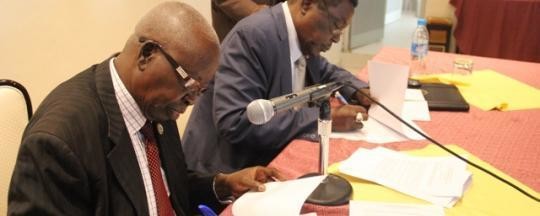The head of a tribal group of politicians that serves informally as an advisory council to President Salva Kiir has revealed that they proposed to the president the division of the country into 24 states, not 28 states as announced by Kiir on 2 October.
Kiir issued a presidential order on 2 October dissolving the country’s ten constitutionally established states and their constitutions and replacing them with 28 new states carved out largely along ethnic lines. At first he claimed powers to alter the state boundaries and appoint their governments but later he decided to take the decision to parliament because of the constitutional implications of the decision.
A constitutional amendment has been introduced in parliament to adopt Kiir’s proposal for 28 states and to grant him powers to appoint all state MPs and all state governors.
Ambrose Riiny Thiik, head of the Jieng (Dinka) Council of Elders, disclosed in a recent newspaper interview that President Salva Kiir unilaterally added four new states to a proposal for 24 states initiated by his council.
The head of the Dinka tribal council told the Juba-based Al-Maugif newspaper in an interview published yesterday that they proposed creation of 23 states and later increased it to 24 only when the proposal reached President Salva Kiir’s office.
“The proposal started with 23 states, and when it was handed over to the Office of President, the number reached 24 states. So, that was the final number in the proposal,” said Ambrose, who is also a former chief justice.
“The president was the one who added four states. When the President announced the creation of states, we found that there were additional four states, we do not know the source of these new ones,” he added.
However, Ambrose said President Kiir has the constitutional right to issue the final decision, saying he is the only person who decides to reject the proposal or approve it or amend it.
The tribal leader commented that there are problems that emerged in the creation of new states, but he said it is the government’s mandate to solve them. He noted that he supports the creation of 28 states, which he said was a popular demand by the people of South Sudan.
Ambrose denied accusations that the council played a role in influencing any decisions taken by President Kiir. “This is nonsense, we know that those who are talking like that are venomous people like the rebels and SPLM-G10, we have our own democratic and patriotic view, is our stance with the president a problem?” he asked.
The newspaper article did not specify which 23 states were included in Ambrose’s original proposal, but a map circulated in an unnamed proposal to some tribal leaders last year includes only 23 states and differs from Kiir’s proposal in several key respects.
This earlier proposal divides Lakes into two states and not three, it divides Western Equatoria into two states and not three, and it does not include a ‘Terekeka State’ as later proposed by Kiir, instead including this territory as part of Jubek State, thereby splitting the Mundari tribe from the Bari.
Additionally, Kiir’s proposal divides the Gawaar Nuer from the Lou Nuer in Eastern and Western Bieh states, a feature not included in the earlier proposal in which Bieh state was one. He further splits the Nuer clans of southern and central Unity State into Southern and Northern Liech states, whereas in the earlier proposal they are part of a single state.
The Jieng Council of Elders is a group of influential Dinka politicians and relatives of President Salva Kiir. It is not a council of traditional tribal leaders.




